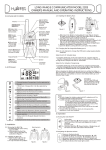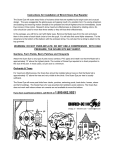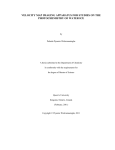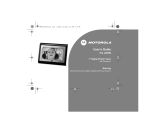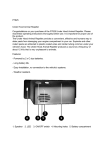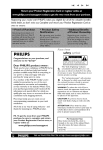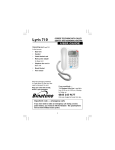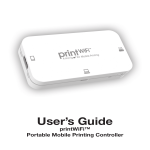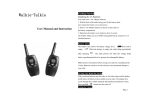Download TREK100
Transcript
TREK100 Private mobile radio USER GUIDE Antenna Indicator lighting Enter/Key Lock/ Lamp Button Ear/Mic jack PTT (PUSH to TALK) button - Press and hold to transmit. 2.2 Installing the Belt Clip a. Slide the Belt Clip into the slot as shown in Figure 2. b. A “click” indicates the Belt Clip is locked into position. Caution: Danger of explosion if battery is incorrectly placed. For the regular batteries, replace only with AAA/LR03 or equivalent type. For the Rechargeable battery pack, replace only with same type and make of the battery pack that comes with the unit. Belt clip latch Remove the batteries/battery pack if the unit will not be used for a long period of time. To reduce the risk of electric shock, do not expose this appliance to rain and moisture. 3. Operation Figure 1 Figure 2 a DO NOT CALL button - Press to send ringing tone to other PMR units Mosquito Repeller Mic (Microphone) Menu Button -Press to program the PMR settings. Speaker Car Adaptor charge jack/AC-DC charge jack 1. LCD Screen Channel Number. Changes from 1 to 8 as selected by the user. CTCSS Code. Changes from 1 to 38 as selected by the user. Displays the current Battery charge level. Displayed when the Vox feature is enabled. Displayed when transmitting a signal. Displayed when receiving a signal. Displays the transmitting Power level (Hi /Lo ). Blinks during Channel scan mode. RSEL TX Power H/L (High/ Low) button - Press to select the power H/L setting. REVE (Power) button - Press and hold to turn the PMR unit ON or OFF. (UP)/ (DOWN) buttons - Press to change channels, volume, and to select settings during programming. d Figure 3 K Y PAC ED. CAUS BATTER LD BE ABLE UIT WOU HARGE700mAh E SHORT CIRC 4.8v Y, OTHERWIS MBLE ASSE MON (Monitor) button - Press to monitor the current channel. 2.1 Removing the Belt Clip a. Pull the Belt Clip Latch away from the PMR. b. While pulling the Belt Clip Latch, push up the Belt Clip as shown in Figure 1. H REC Ni-M LCD Screen -Displays the current channel selection and other radio symbols. Charging the Rechargeable Battery pack continue... 2. Installation b c Charge contact pin Charge contact point Figure 4 Figure 5 a. Slide down the Battery Compartment Cover (Figure 3) latch located on the bottom of the PMR, then slide down the Battery Compartment Cover as shown in Figure 4. b. Install the 4.8V, 550 mAh Ni-MH (Nickel Metal Hydride) rechargeable battery pack (included) as shown in Figure 5. OR Use 4 x 1.5V AAA/LR03 regular alkaline batteries paying attention to the polarity marking in the battery compartment. c. Replace the Battery Compartment Cover. d. Lock the Battery Compartment Cover Latch into position. 2.4 Charging the Rechargeable Battery pack Note: Do not attempt to charge the PMR when using regular alkaline batteries. Using the AC-DC Adaptor (Dual type) plug a. Insert the small plug on the end of the AC-DC adaptor into the AC-DC charger jack located at the bottom side of the unit (Figure 6). b. Plug the AC adaptor into the AC wall outlet. Using the Car Adaptor charger plug (optional) a. Insert the small plug on the end of the Car adaptor charger plug into the Charger jack located at the bottom side of the unit (Fig. 7). b. Plug the Car adaptor into the car cigarette socket. When charging, the Battery level indicator icon will start scrolling on the LCD Screen. It takes about 10 hours to fully recharge the battery if they've become completely run down, new battery takes up to 14 hours to fully charge. Displayed when the Dual Watch function is turned ON. Displayed when the Key Lock feature is activated. Displayed when sending Call-Ring tone to other PMR units. Displays when the Stopwatch feature is turned ON. Displays during Monitor operation, and Speaker volume selection. Displays when the Mosquito Repeller function is activated. Displayed when the Scrambler function is turned ON. Important: Turn OFF the PMR unit when charging. Charge the Battery pack 10~14 hrs. prior to initial use. Figure 6 Figure 7 Notes: Do not charge the battery using both AC adaptor and Car Charger adaptor at the same time. 3.1 Turning the Unit ON/OFF To Turn ON; a. Press and hold the (Power) button. A special “beep" sound will be heard and the LCD Screen will display the current channel. To switch OFF; b. Press and hold the (Power) button. A special “beep" sound will be heard and the LCD Screen will turn blank. 3.2 Adjusting the Speaker volume There are 8 volume levels. To adjust the speaker volume level, press the (UP) button to increase, or press the (DOWN) button to decrease. During the adjustment, the LCD Screen will display the speaker icon and the corresponding number of the volume level at the lower left corner. 3.3 Receiving a Call The unit is continuously in the Receive mode when the unit is turned ON and not transmitting. When a signal is received on the current channel, the RX icon will be displayed on the LCD Screen and the LED indicator will turn on. 3.4 Transmitting (sending) a. Press and hold the PTT (Push to Talk) button to transmit your voice. The TX icon will display on the LCD Screen. b. Hold the unit in a vertical position with the Mic (Microphone) 5 cm away from the mouth. While holding the PTT button, speak into the mic (microphone) in a normal tone of voice. c. Release the PTT button when you have finished transmitting. Important: Check the channel activity by pressing and holding the M (Monitor) button. You will hear static if the channel is unoccupied. Do not transmit if someone is talking on the current channel. In order for other people to receive your transmission, they must also be on the same Channel and CTCSS code (if applicable) that you are currently using. Refer to the "Changing Channel" section for more information. 4. Functions and Settings 4.1 Changing Channels The PMR has 8 available channels. To change channels, in normal mode; a. Press the button once, the Channel number icon will start blinking on the LCD Screen. Changing Channels continue... b. While the Channel number icon is blinking, press the (UP) or (DOWN) button to select the desired channel. The channel changes from 1 to 8, or from 8 to 1. c. Press the (Enter) button to confirm your selection and return to the normal mode. Note: Refer to the "Channel Table" section of this Owner’s Manual for detailed frequency listing. 4.1.1 Monitor You can use the Monitor feature to check for weak signals on the current channel. a. Press the button for 1 second to hear everything on the current channel for 15 seconds. Press the button again to turn off the Monitor operation. 4.2 Changing the CTCSS sub-channel Each of the 1-8 channels has 38 sub channels (CTCSS code), letting you to set up group of users within the same channel. To change the CTCSS sub-channel; a. Press the button twice, the CTCSS number icon will start blinking on the LCD Screen. b. While the CTCSS number icon is blinking, press the (UP) or (DOWN) button to select one of the 38 CTCSS sub-channels. (Set this option to “00” to allow the user to transmit and receive a call using the main channels only.) c. Press the (Enter) button to confirm your selection and return to the normal mode. 4.3 Setting the Channel Scan Channel scan performs searches for active signals in an endless loop from channels 1 to 8. To turn ON; a. Press the button 3 times, the (SCAN), Channel number, and the CTCSS number icons will start flashing on the LCD Screen. (UP) or (DOWN) button to activate the b. Press the channel scan mode. c. The channel number on the LCD Screen changes rapidly until an active signal is detected. (To deactivate the channel scan mode, press the (Enter) button. The LCD Screen will immediately return to the normal mode with the previous channel setting.) d. When an active signal (one of the 8 channels) is detected, channel scan pauses on the active channel. (Enter) button to communicate with the active e. Press the signal channel, and the channel scan will be deactivated. Note: When the Channel Scan is activated, the VOX function will be temporarily disabled until the Channel Scan function is turned OFF. 4.4 Setting the Scrambler Mode The Scrambler mode makes your transmission voice sounds garbled to anyone listening. To operate this function, both PMR units (Transmitting and Receiving units) must be set with the same Scrambler mode setting. To activate the Scrambler mode; a. In normal mode, press the button 4 times, the (Scrambler icon) will display and the OFF icon will start blinking on the LCD Screen. (UP) button or (DOWN) button to select b. Press the the desired scrambler mode (off, 1, 2, 3, or 4). Setting the Scrambler Mode continue... c. Press the (Enter) button to confirm your selection and return to the normal mode. 4.5 Changing the Call-Ring tone You can use the Call-Ring tones to alert the other user/s or to identify yourself. The PMR is equipped with 10 different types of Call-Ring tones. To change the Call-Ring tone setting, in normal mode; a. Press the button 5 times, the (Call-Ring tone icon) will be displayed on the LCD Screen and the current Call-Ring tone number will start blinking. b. While the Call-Ring tone icon is blinking, press the (UP) or (DOWN) button to change the setting. A respective Call-Ring tone sound will be played when changing from one tone to another. c. Press the (Enter) button to confirm your selection and return to the normal mode. 4.5.1 Sending a Call-Ring tone a. With the PMR in normal mode, press the button. The microphone will be muted and the unit will transmit the current Call-Ring tone to other user/s set to the same Channel and CTCSS code. 4.6 Setting the DW (Dual Watch) This unit is capable of monitoring two channels (main channel, and the DW channel) in the standby mode. However, the unit can only transmit a call using the main channel. The DW channel can only monitor/receive a call transmitted by other users with the same channel and CTCSS code setting as the DW channel. To activate the Dual watch mode; a. In normal mode, press the button 6 times, the (DW) icon will start blinking on the LCD Screen. b. Press the (UP) or (DOWN) button to select the DW (dual watch) channel (1~8, except the main channel). Otherwise, set this option to “OFF.” c. Press the (Enter) button to confirm your selection and return to the normal mode. In the normal mode, the LCD screen will alternately display the Main and the DW channel numbers. Whereby the CTCSS code is applicable, the user must set first the CTCSS code number prior to setting the DW channel number. Note: When the Dual Watch function is activated, the VOX function will be temporarily disabled until the Dual Watch mode is turned OFF. 4.7 Setting the VOX (Voice Activated) Sensitivity In VOX mode, the PMR will transmit a signal only when it is activated by your voice or other sounds around you. The unit will transmit for a further for 1 second even if you stop talking. To set the VOX sensitivity level; a. Press the button 7 times, the (Vox) icon will start blinking on the LCD Screen. b. Press the (UP) or (DOWN) button to select the VOX (off, 1, 2, 3, or 4) sensitivity. c. Press the (Enter) button to confirm your selection and return to the normal mode. While the VOX mode is on, pressing the (enter) button for 1 second can suspend the VOX transmission for 4 seconds. VOX operation is not recommended if the PMR will be used in a noisy or windy environment. 4.8 Setting the Mosquito Repeller Mode a. In normal mode, press the button 8 times, the (Mosquito Repeller icon) will display and the “OFF” icon will start blinking on the LCD Screen. b. Press the (UP) or (DOWN) button to select your preferred mosquito repeller frequency (1~4) or set this option to “Off.” The table below shows the Mosquito Repeller frequency chart setting. Item Frequency Cadence 1 48Hz Continued 2 3 6.5KHz 5.5KHz, 6.5KHz, 7.5KHz, 8.5KHz, 9.5KHz Continued 6s for each frequency 4 6.5KHz - 9KHz Sweeping Note: To get the best performance, try to adjust to different frequency. The Mosquito Repeller signal can not be activated during Transmitting, Receiving, Monitoring, Channel Scan and Dual Watch scan operation. It is not recommended to use the Mosquito Repeller with high VOX sensitivity. The PMR may be triggered to transmit signal accidentally using the Mosquito Repeller signal. 4.9 Setting the Stop-Watch a. In normal mode, press the button 9 times, the (Stop-watch icon) will display and the Channel icon will be blinking on the LCD Screen. b. Press the (UP) button the timer start counting on the LCD Screen. c. Press the (DOWN) button to stop the timer from counting. Pressing the (DOWN) button again to reset the timer display back to zero. button to return to the normal mode. d. Press the Note: The PMR’s Transmit and Receive function will still operate even if the Stop-watch function is in operation. However, the Call-Ring tone function will be temporarily disabled. 5.3 Busy Indicator (RSSI Indicator) Anytime when the PMR detects a valid signal on the current channel, the BUSY indicator will display on the LCD Screen and the Indicator lighting will light green. However, the speaker will only be enabled when the signal matches the current CTCSS code. 5.4 LCD Screen Back Light Every time a button is pressed (except PTT, Call, and Power buttons), the LCD Screen back light will illuminate for 4 seconds. 5.5 Microphone/Earphone Jack The PMR is equipped with an auxiliary microphone and earphone jack (located at the upper side near the antenna). The headset may or may not be included with the package. 5.6 Battery Meter Indicator The PMR can detect the battery charge in the following levels; Battery charge at high level. Battery charge at medium level. Battery charge at low level. At this level, the PMR will emit a “beep” sound for every 15 seconds in normal mode. Important: Charge the unit for 10~14 hours. Battery charge at very low level. At this level, the other icons in the LCD Screen also turns OFF. Important: Charge the unit for 10~14 hours. 5.7 Restore Default Settings This feature allows the user to restore the setting of channel, CTCSS, & Volume, VOX, Scrambler mode, Mosquito Repeller, and Tx power level. a. In normal mode, press and hold the and (Power) buttons first, and then quickly press the PTT button. The PMR will restore all default settings as the following table. Channel CTCSS sub code 01 00 Scrambler mode Mosquito Repeller OFF OFF Volume VOX 08 OFF Hi/Lo Power High Call Melody No. 7 6. Specifications 5. Auxiliary Features 5.1 Key Lock The Key Lock feature allows the user to disable the (UP), (DOWN), Monitor, and the Menu buttons so that the PMR settings could not be changed accidentally. a. To activate the Key Lock feature, press and hold the button until the (Lock) icon appears on the LCD Screen. b. To deactivate the Key Lock feature, press and hold the button until the (Lock) icon disappears on the LCD Screen. The PTT, H/L, Call, and the (Power) buttons will remain functional even if the Key Lock feature is activated. 5.2 TX Power H(High)/L(Low) feature This feature permits the selection of the transmitting power level to high or low. Before transmitting a speech to other PMR units, press the H/L button to select the desired power output . If High is selected, the PMR will transmit at maximum power and at a longer transmission range. Binatone Help Line - 0845 345 9677 Channels Available 8 Channels CTCSS Sub-channel Output Power (TX) 38 for each Channel 0.5W Range About 8 Kms. (High) / 4 Kms. (Low) Channel Frequency Table Channel Frequency (MHz) Channel Frequency (MHz) 1 446.00625 5 446.05625 2 446.01875 6 446.06875 3 446.03125 7 446.08125 4 446.04375 8 446.09375 CTCSS (Continuous Tone Coded Squelch System) Code Frequency (Hz) Code Frequency (Hz) 1 67.0 20 131.8 2 3 71.9 74.4 21 136.5 22 141.3 9. Guarantee and service CTCSS Continue... Code Frequency (Hz) Code Frequency (Hz) 4 5 6 77.0 79.7 82.5 23 24 25 146.2 151.4 156.7 7 85.4 26 162.2 8 88.5 27 167.9 9 91.5 28 173.8 10 11 94.8 97.4 29 30 179.9 186.2 12 100.0 31 192.8 13 103.5 32 203.5 210.7 14 107.2 33 15 110.9 34 218.1 16 114.8 35 225.7 17 118.8 36 233.6 18 123.0 37 241.8 19 127.3 38 250.3 10. Troubleshooting Guide The Binatone TREK 100 is fully guaranteed for 12 months from the date of purchase shown on your sales receipt. The guarantee does not cover damage by misuse or negligence, or by excessive voltage. Please keep your sales (till) receipt - this is your guarantee. You should also keep the original packaging materials. When unpacking your Binatone TREK 100, check for visible damage. If you see any damage, do not use the PMR - return the whole unit to where you bought it. If your Binatone TREK 100 develops a fault, refer to the “Troubleshooting Guide.” section of this manual. If you can’t solve the problem, return the whole unit as follows; Solution Symptom No power. Check the battery pack is installed properly. The batteries may be weak. Replace the old battery pack with a new one. Reception is weak. Press the (UP) button to increase the receiver volume level. The receiving signal may be weak and/or out of range. If this happens press the M (Monitor) button. Cannot change CTCSS subchannels. Key lock mode must be deactivated if the Key lock icon ( ) is displayed on the LCD Screen. To change CTCSS sub-channel, press the (Menu) button twice, the CTCSS icon blinks on the LCD Screen. Press the (UP) or (DOWN) button to change the CTCSS sub-channel. Batteries may be weak. Range is limited. Replace with new batteries if the charge level indicator gets low. Check the TX Power H/L setting. See the “Effective Range” diagram. The maximum range will vary depending on terrain and environment. Open fields provide the maximum range, while steel/concrete structures, heavy foliage, and use in buildings and in vehicles may limit the range significantly. Wearing the radio close to the body, such as in a pocket or on a belt, will decrease range; change the location of the radio. Sound distortion problems. If you are transmitting, speak in a normal tone of voice, 5 cm away from the Mic (microphone.). If you are receiving, lower the volume to a comfortable level. Radios too close. Radios must be at least 2 meters apart; increase your distance. Radios too far apart. Obstacles interfere with transmission. Talk range is up to 8 Km (High power), 4 Km (Low power) in clear unobstructed conditions. Scrambler mode not operable. Check the Scrambler mode setting. Both PMR units (Transmitting and Receiving) should be set to the same Scrambler mode setting. No communication. Check the Channel and the CTCSS code setting. Both PMR units (Transmitting and Receiving) should be set to the same Channel and CTCSS code (if applicable) setting. Mosquito Repel not effective. Adjust the Mosquito Repeller frequency and check the most effective frequency to get the best performance. 7. Safety CAUTION Damaged Antenna Do not use any PMR that has a damaged antenna. If a damaged antenna comes in contact with the skin, a minor burn may result. Batteries All batteries can cause property damage and/or bodily injury such as burns if conductive material such as jewelry, keys, or beaded chains touch exposed terminals. The material may complete an electrical circuit (short circuit) and become quite hot. Exercise care in handling any charged battery, particularly when placing it inside a pocket, purse, or other container with metal objects. WARNING For Vehicles with an Air Bag Do not place your PMR in the area over an air bag or in the air bag deployment area. Air bags inflate with great force. If a PMR is placed in the air bag deployment area and the air bag inflates, the PMR may be propelled with great force and cause serious injury to the occupants of the vehicle. Potentially Explosive Atmospheres Turn your PMR OFF when in any area with a potentially explosive atmosphere, unless it is a type especially qualified for such use (for example, Factory Mutual Approved). Sparks in such areas could cause an explosion or fire resulting in injury or even death. Repair after the Guarantee has expired If the unit is no longer covered by Guarantee, first follow steps 1 as for repair under Guarantee, Then... 2. Call our service Department on 0845 345 9677 and ask for a quotation of the repair charge, and details of where to send your TREK 100 for repair. 3. Return your TREK 100 to the address given by the Service Department, making sure to include your name and address, and a cheque or postal order for the value of the repair charge. Binatone Telecom plc operates a policy of continuous product improvement, and so reserves the right to make changes to the product and functions without prior notice. Effective Range The Transmission range of the product is dependent on the environment terrain where it is being used, the following diagram attempts to guide the user on the sort of performance to expect for everyday use. Signal Strenght Optimum (open area) (1) Batteries Do not replace or charge batteries in a potentially explosive atmosphere. Contact sparking may occur while installing or removing batteries and cause an explosion. Blasting Caps and Areas To avoid possible interference with blasting operations, turn your PMR OFF near electrical blasting caps or in a “blasting area” or in areas posted: “Turn off the twoway radio.” Obey all signs and instructions. NOTE: Areas with potentially explosive atmospheres are often, but not always, clearly marked. They include fueling areas such as below deck on boats; fuel or chemical transfer or storage facilities; areas where the air contains chemicals or particles, such as grain, dust, or metal powders; and any other area where you would normally be advised to turn off your vehicle engine. This equipment is intended for use in: This does not affect your statutory rights. Medium ground based obstruction (2) Spain Austria Finland Latvia Belgium France Liechtenstein Sweden Bulgaria Germany Luxemburg Switzerland Croatia Greece The Netherlands Turkey Cyprus Hungary Norway UK Czech Iceland Poland Romania Denmark Ireland Portugal Slovakia Estonia Italy Slovenia Countries of use Declaration of Conformity The Binatone TREK 100 complies with the essential requirements Heavily built up area (3) 0 Range (Km) 8 Range Slope Range Check The Transmission range will be affected as shown in the above diagram. The transmitting range typical values for different environment conditions will be (1) 8 km (2) 4 km (3) 2 km. It should be remembered that these are only guide values as actual achieved distances will be dependent on the environment and terrain. And conforms to the following relevant standards: Waste electrical products must not be ETSI EN 300 296-2 V1.1.1 disposed of with household waste. ETSI EN 301 489-5 V1.3.1 This equipment should be taken to your local recycling centre for safe ETSI EN 301 489-1 V1.4.1 treatment. EN 60065: 2002 Binatone Telecom plc operates a policy of continuous product improvement, and so reserves the right to make changes to the product and functions without prior notice. 8. Cleaning and Care To clean your PMR, use a soft cloth dampened with water. Do not use cleaners or solvent, which may cause damage that may not be covered by guarantee. Binatone Help Line - 0845 345 9677 UK (BTP) Ver 4 Jan 06


